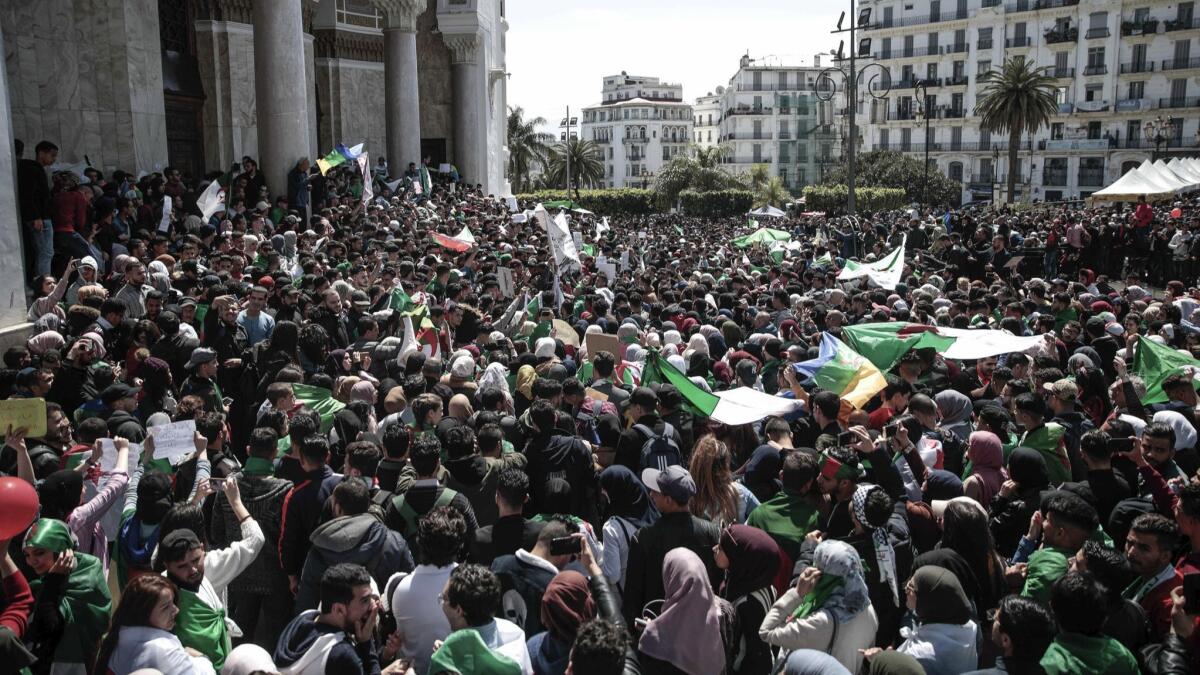Algeria protesters press for new government leadership beyond a new president

- Share via
Reporting from Beirut — It took six weeks for Algerian protesters to force Abdelaziz Bouteflika, the country’s 82-year-old ailing president, to end his nearly 20-year rule this month.
But the protests, which began in February and drew millions of people — students, lawyers, farmers, artists, workers, public employees — on successive Fridays, have not stopped.
Instead, they spawned daily demonstrations that have coalesced around the slogan “Yetnahaw gaa”: All must go.
On Tuesday, protesters calling for a clean slate of leadership in the North African country made clear that parliament’s designation of Bouteflika associate and upper house leader Abdelkader Bensalah as interim president was unacceptable.
“Bouteflika was like a doll, but the whole power behind him is the one that is ruling now,” said Reda Reri, a 25-year-old engineering student in Algiers. “We want them all to get out.”
The protesters’ slogan is a reference to their central message: Their coming out to the streets has not fully been about Bouteflika, who suffered a stroke in 2013 that left him largely incapacitated.
Their aim is to change the system, the cabal of political, military and business leaders, many of them veterans of the 1954-62 war of independence against France, that has supported Bouteflika’s sclerotic government.
“Of course the protests have to continue,” Reri said in a phone interview. “It’s time to remove what’s eating state funds and the resources of the country. We have a lot of corruption and we have to stop it.”
The challenges facing protesters include whether they can continue to pressure the government and how the government, especially the military, will react to such pressure.
In his resignation statement April 2, Bouteflika said he had “taken the appropriate measures, as part of my constitutional prerogatives, to ensure that the state and its institutions will continue to normally function during the transition period, leading to the election of the new president of the republic.”
Thus far, that has meant the government continuing under the stewardship of what protesters call the “3Bs”: Bensalah, 76, who was named interim president for 90 days; Prime Minister Noureddine Bedoui, 59; and the head of the Constitutional Council, Tayeb Belaiz, 70.
They are viewed as hopelessly tarnished by their long association with Bouteflika. Protesters consider them disconnected from the masses, many of them young people who have seen little of the nation’s riches, even though it supplies a third of Europe’s needs in natural gas.
The three leaders’ positions as heads of the transition were a “misstep that gave the street the justification for more protests,” said Hasni Abidi, director of the Geneva-based Study and Research Center for the Arab and Mediterranean World.
“People will continue to occupy the public space to demand the departure of all the symbols and the figures of the system,” said Abidi in a chat on social media Tuesday. “It is unrealistic to entrust the organization of important transitional elections to a government headed by a former minister of interior and head of government designated by Bouteflika.”
The nation’s military, which had supported Bouteflika, is expected to continue playing a key role. When the protests began, Lt. Gen. Ahmed Gaid Salah, the 79-year-old army chief and onetime Bouteflika ally, called on people to stay home.
As protests continued, Salah declared the army was with the people and called for applying Article 102 of the constitution, which would remove the president for reasons of ill health.
Days after Bouteflika’s resignation, the army pressured Algeria’s spy chief, Gen. Athmane Tartag, who was known as “Bachir,” to leave as well.
Though protesters have largely been friendly with soldiers, many point to the Arab Spring experience in Egypt in 2011. The army pushed out President Hosni Mubarak and later seized power through one of its own, Abdel Fattah Sisi.
In the 1990s, Algeria experienced the so-called Black Decade, when the army, wary of Islamists who had won the country’s elections, launched a war that killed hundreds of thousands of people. Bouteflika led the country for years on the strength of having navigated the country to peace.
Anys Mezzaour, a 22-year-old author and activist in Algiers, said Salah, the army chief, invoked a statement that referred to the people being the source of all authority. It drew support from protesters, Mezzaour said.
“One solution would be to get rid of the constitutional framework and to elect a constituent assembly,” he said. “Many voices are asking for this…. Salah may have to grant this to the people if he wants to end restlessness.”
Protests are expected again Friday, and there may be a general strike.
Dalia Ghanem Yazbeck, resident scholar at the Endowment for International Peace, Carnegie Middle East Center in Beirut, said the strength and weakness of the protests have been that they have been leaderless. Now there is a need for more organization, she said.
“Now is the time of civil disobedience,” Yazbeck said. “If judges, lawyers, civil servants, oil and gas employees, if they all refused to do their job then the government could not continue.”
In any case, said Mezzaour, any transition organized by those with ties to Bouteflika would be rejected.
“Many dangers are still on our road towards full democracy,” he said. “We are all deeply aware that it won’t be easy, that the [system] sacrificed Bouteflika just so it can regenerate.”
More to Read
Sign up for Essential California
The most important California stories and recommendations in your inbox every morning.
You may occasionally receive promotional content from the Los Angeles Times.











